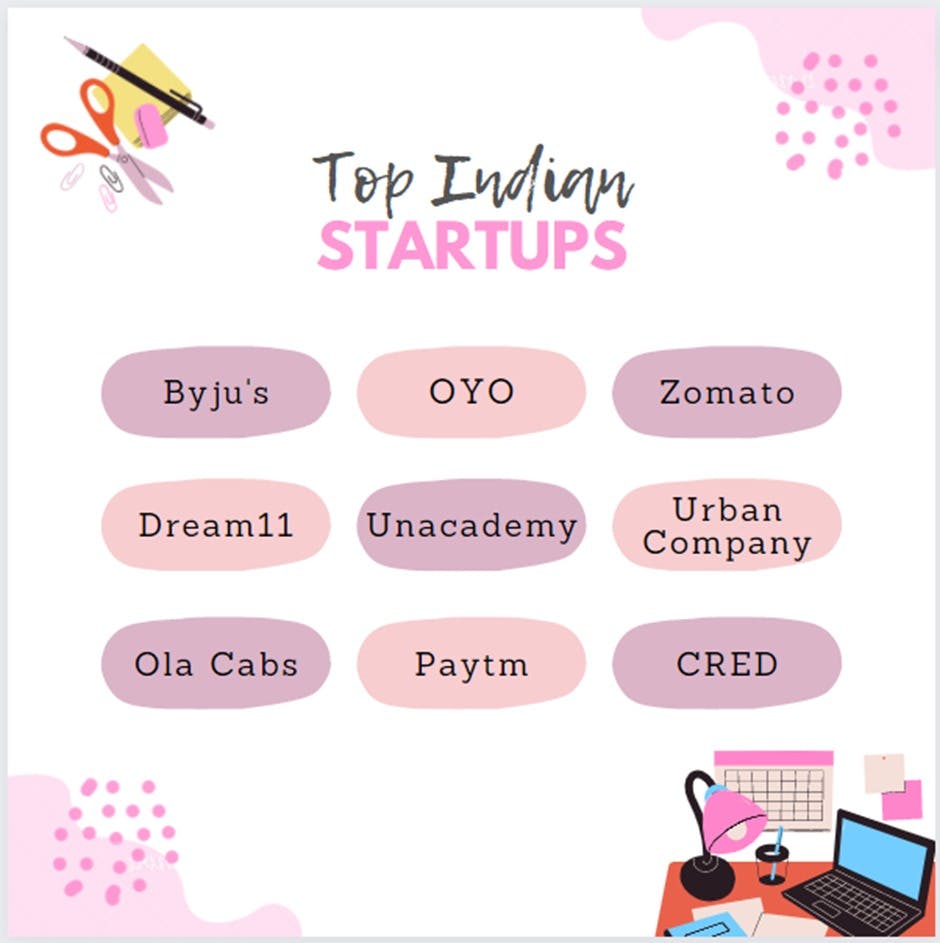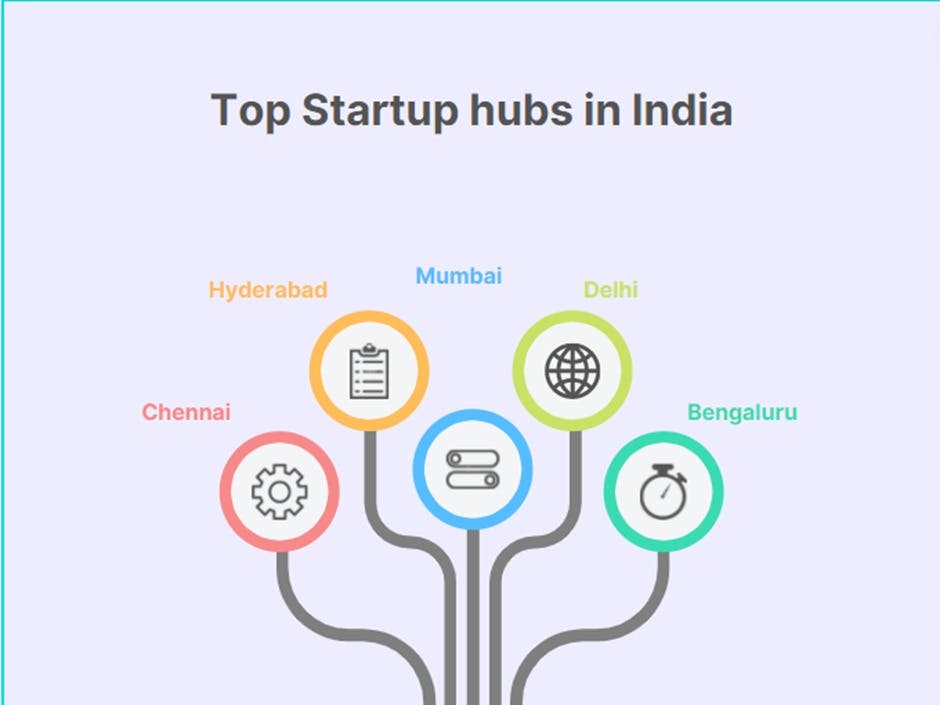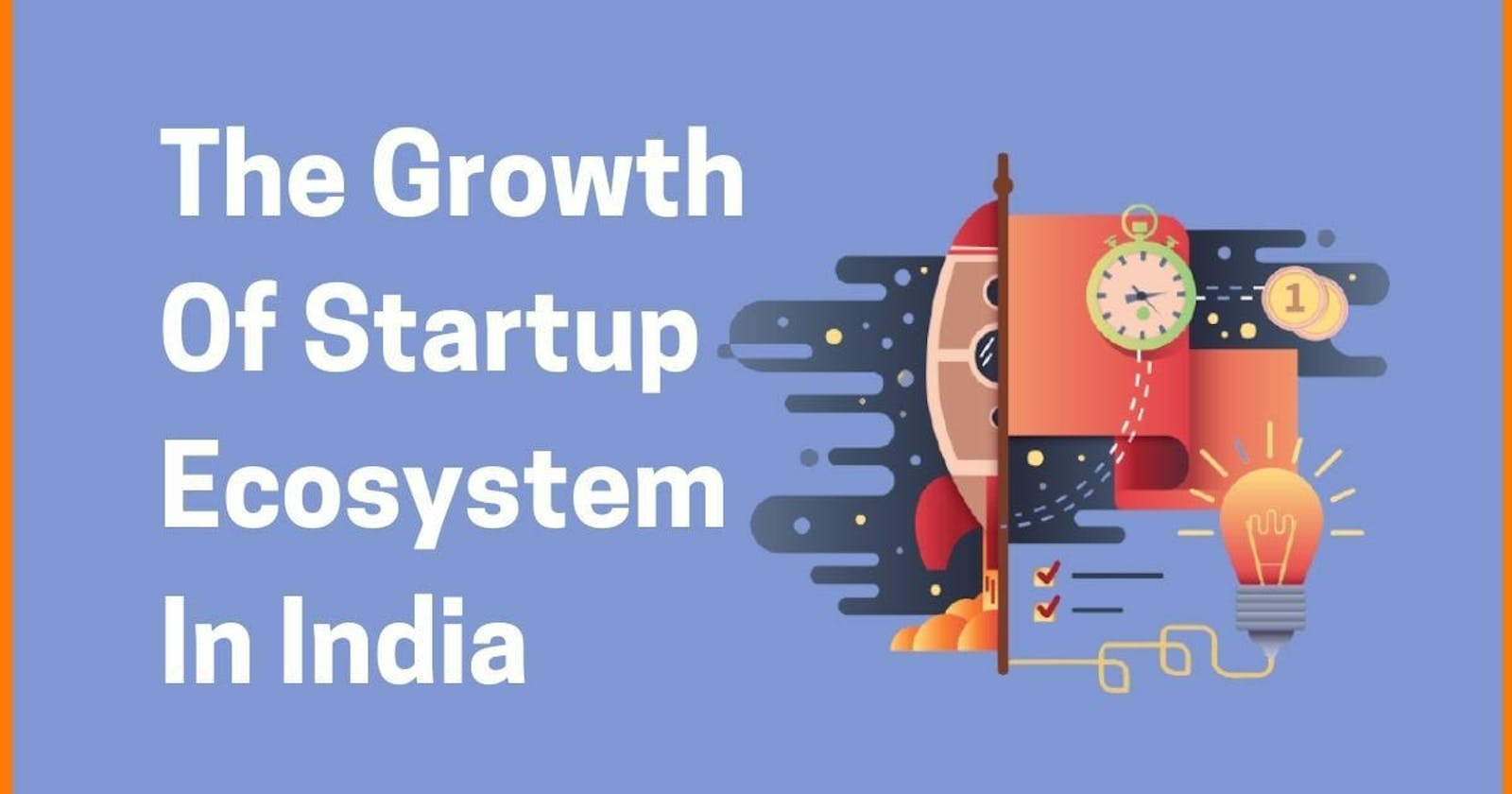Despite the worldwide economic downturn caused by the Covid-19 crisis, numerous Indian start-ups have survived despite the negative impact on the business world. In contemporary times, terms like StartUp, Entrepreneurship, Seeding have been prominent topics of debate among young people in recent years.
For a few years now, the watchword has been startups and unicorns, and this decade has been the decade of startups. We've watched the birth and fall of a variety of startups all over the world. The same may be said for India.
From urban company to Byju's, Ola Cabs to Nykaa, With one of the world's finest start-up ecosystems, India is quickly becoming the favorite camp for unicorns.
Today in this blog, we will be talking about the whole ecosystem of Indian startups.
INTRODUCTION
Before diving into how India evolved as a startups hub, it's important to understand what a startup is.
A startup is an initiative or a firm that is formed to solve complex problems that have never been solved before or to improve on those which have already been solved.
As stated by our Prime Minister Mr. Narendra Modi “ Startups ate the engines of exponential growth manifesting the power of innovation. Several Big companies today are the startups of yesterday.”
The last two year was marked by ups and downs, particularly as a result of the global COVID-19 pandemic. Many successful Indian entrepreneurs have pursued business possibilities and put their ideas to the check. While some of them flopped, others flourished like nothing else. Because startups provide low-cost trained labor, money from national and international investors, and opportunities to grow, India encourages the growth of startups.
In so many regions of the globe, startups have received a lot of attention in recent years. The variety of startups in India is rapidly increasing, and more support is now available in all areas. On the back of strong federal policies to encourage innovation and growth, as well as significant funding from prestigious venture capital and private equity firms, India is emerging as a goat player in the global start-up ecosystem, alongside the United States, China, the United Kingdom, and others, in recent years. India's startup experience is not new, with tech-giants like Infosys and Airtel, as well as many more, launching in the 1980s and 1990s and going on to become mainstays in their chosen fields.
The number of startups is growing, and they are increasingly being acknowledged as major engines of economic growth and employment creation. Startups can produce meaningful solutions and so operate as vehicles for economical evolvement through innovation and scalable technology.
Tech start-ups are capitalizing on rising digital usage to transform the lives of Indian youths. The paradigm shift from offline to online, from purchasing to food delivery from eateries and accessing entertainment on the go. These start-ups can influence the next leg of economic growth with more success stories, improved digital infrastructure, and favorable regulations.
The survey report shows that Indian companies raised USD 12.1 billion in the first half of 2021, demonstrating the ecosystem's unrivaled development. India has created 24 unicorns as of August 2021, featuring 6 in just four days in April.
Bengaluru and the neighboring state of Karnataka are also homes to more than 400 global Research and development centers, making it India's fourth-largest technology and innovation hub. Along with Mumbai, several other Indian states, notably Chennai, Pune, and Hyderabad, were included in the 'Top 100 Emerging Ecosystems' ranking.
Last month, according to the reports by the Economic Survey 2021-22, released ahead of the Union Budget, designated Delhi as India's startup capital, a distinction previously held by Bengaluru.
The national survey, which took place between April 2019 and December 2021, concluded that Delhi had over 5,000 registered startups, overtaking Bengaluru (which had 4,514 businesses) in the number of startups amongst cities. The Morning Standard met with five successful entrepreneurs who have helped to make the jugaad capital the country's startup powerhouse.
Startup India Program
The Honorable Prime Minister Mr. Narendra Modi initiated the Startup India program on January 16, 2016. The Prime Minister announced an Action Plan with 19 Action Points that would serve as a roadmap for the startup drive.
Startup India has devised a three-pronged campaign to operationalize its implementation plan toward a "pro-entrepreneurship" mindset.
- to facilitate an ordinary platform to connect the entire ecosystem while reducing data asymmetry,
- to provide assistance and other essential support, and
- to engage regional entrepreneurs in transforming their ideas into business ventures.
One of the main goals of the Startup India program is to use different engagement strategies to help interconnect the Indian startup ecosystem to global startup ecosystems. Startup India has established ties with over ten countries, which serve as a soft-landing base for companies from those countries and aid in cross-collaboration. By developing alliances, expertise exchanges, and financial assistance mechanisms, alliances and cooperation with other startup ecosystems have also demonstrated to be powerful propellants for India's startup enthusiasm.
The key pillars of the StartUp India program:
- SIMPLIFICATION & HANDHOLDING
- INDUSTRY-ACADEMIA PARTNERSHIP & INCUBATION
- FUNDING SUPPORT &INCENTIVES
In relation to the number of Startups, below are the top aimed domains:
- IT SERVICES
- HEALTHCARE & LIFE SCIENCES
- EDUCATION
- GREEN & CLEAN TECHNOLOGY
- PROFESSIONAL & COMMERCIAL SERVICES
- FOOD & BEVERAGES
- AGRICULTURE
- FINANCE TECHNOLOGY
- TECHNOLOGY HARDWARE
- FINANCE TECHNOLOGY
Let's have a look at the five most valued Indian start-ups as we approach 2022.
- Byju's
- Paytm
- Nykaa
- Urban Company
- Unacademy
- boAt
- CRED
- Zomato
- PharmEasy
- Dream11

In India, the number of startups (private, startup enterprises valued at $1 billion or more) is constantly increasing. As per CB Insights, India now has 32 unicorn firms, with eight of them added since 2021. According to Bloomberg, the number of new unicorns could be as high as nine, as the news source also adds API Holdings, an online pharmacy that was not featured on CB Insights (yet).
EdTech, fintech, online gambling and OTT, e-commerce, and corporate technology are the most benefited areas. However, due to the Covid 19 scenario in 2020, total capital inflow into Indian startups is likely to drop by 36.2 percent in 2020, to $8.1 billion, relative to 2019. For the year 2020, total capital inflows into Indian startups are predicted to be at their lowest level since 2017.
Opportunities and Future Trends
With technology evolving at such a rapid pace, more startups are likely to emerge in the nation, and many people may be driven by various government efforts. For the time being, the path for startups appears to be on the correct track.
We may believe that the coronavirus outbreak has made the future of startups dismal. This, meanwhile, is not something to be concerned about. We've seen in the past that the Great Recession was the catalyst for many people to look outside the box.
Future start-ups would expand the range of products and services available. By choosing start-ups, the youth are effectively commercializing science, technology, trade, and other fields. India is no longer focusing its expansion on metropolitan areas. This would not only benefit the economy but will also eliminate gender disparities and geographical disparities. Local companies, particularly those managed by women, tribals, and underprivileged communities, have benefited directly from Start-Ups that operate on the transportation and distribution model.

CONCLUSION
Tech startups are one of the most dynamic, exciting, tough, and successful industry categories, and this year will see even more new and exciting accomplishments. Although the first decade of the twenty-first century was spent bringing India's urban areas and metros online, the last ten years have been spent leveraging the internet to launch enterprises and startups, as well as to spread the digital flame to rural India. India now has the world's biggest working population, which startups are anticipated to capitalize on in the next five years.
Nonetheless, by 2025, India's startup population will have surpassed 100,000, resulting in the creation of more than 3.25 million jobs. Simultaneously, overall funding for Indian startups is expected to exceed $150 billion, with total value creation topping $500 billion. There will be no halting Indian startups once the pandemic crisis and long-term effects have subsided.

